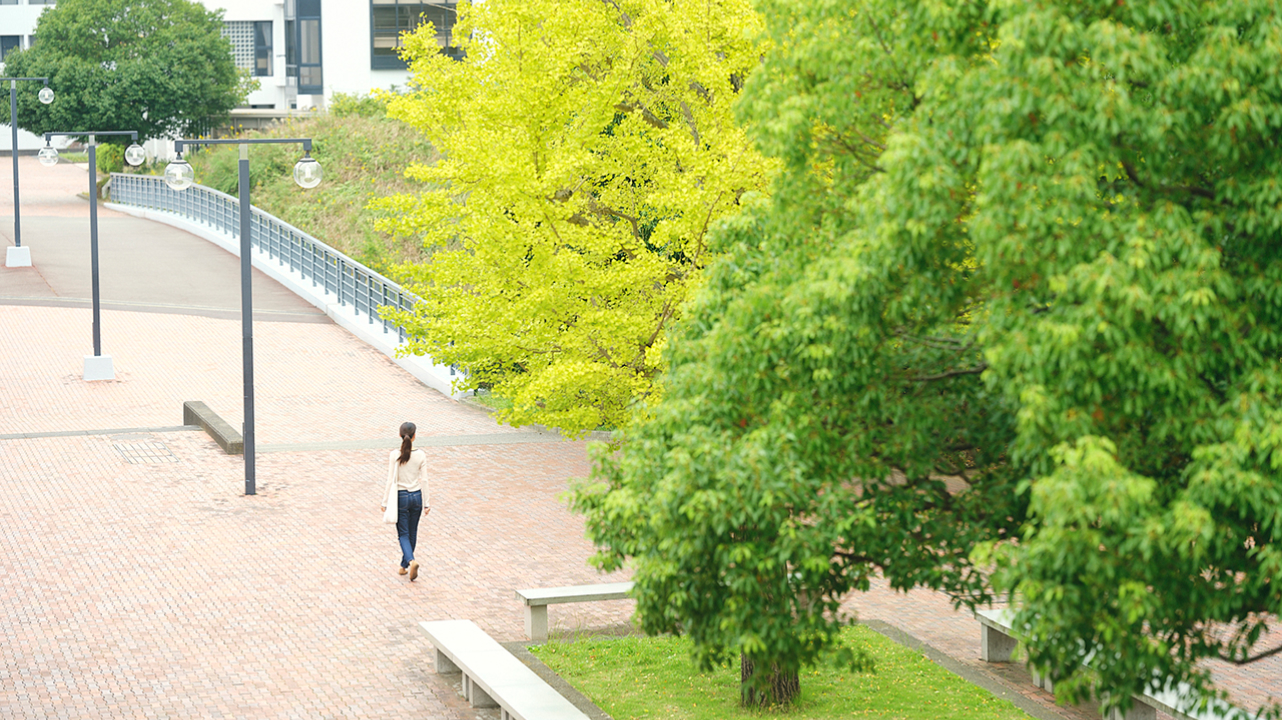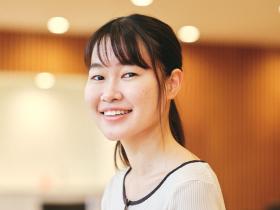The importance of decision-making now, not “eventually”: Becoming the welfare worker I really want to be
College life during the COVID-19 pandemic has made it difficult to plan for the things we want to do, resulting in some people simply watching the days flow by. Ayaka Takaku tells us how the same might have applied to her. “Might have,” she says, because she placed importance on making decisions now rather than “eventually,” and as a result actively participated in various activities. By always taking on the challenge of becoming the person she wants to be, Ms. Takaku provides us with hints regarding how to have a fulfilling student life.


Ayaka Takaku
Second year student, Department of Social Work, Faculty of Sociology & Social Work
Ayaka Takaku joined the Department of Social Work with a desire to study sociology and social work and to eventually do work that will help others. She actively participated in volunteer work as a high school student, but that was brought to a halt due to the COVID-19 pandemic. She found she had more free time after becoming a college student, and wondered how she should use that time. One activity she engaged in was to join the sign language club “Pokke.” Her motto is, “The most important thing is to know what you want to do.”
-
It’s okay if something doesn’t work out, so long as you give it a go
I started college under extraordinary circumstances: our face-to-face entrance ceremony was cancelled, for one thing, and we didn’t even have orientation. Using grants from the University and the government, I hurried to set up a Wi-Fi environment at my home and purchase a computer, and I spent my days facing the many challenges they presented. Even making friends took effort. I connected with classmates I worked in groups with via the Line app, and in May 2020 I joined a University club that I learned about online. Spring semester was over before I knew it.
I didn’t regret how I spent my time, but I found myself vaguely worried that my four years in college would end up passing by in the same way. When my college days are over, I want to be able to say I worked hard and really accomplished something. After the start of summer vacation at the beginning of August 2020, I participated in various online seminars I stumbled across, and I studied to pass the Test of World Heritage Study. That’s also around the time I started as a campus concierge. Through these experiences, I came to ask myself not what I want to do, but what I want to be. I started worrying whether what I was doing would really lead to the future I wanted. Not that I considered my experiences to have been failures. Rather, I started worrying about such issues because I’d been trying new things on a whim, assuming I would find them useful at some point. Things I tried but found boring just weren’t for me, while those I found interesting were suited to me. While we might be in the middle of a COVID-19 pandemic, perhaps it is best to take on everything with such an attitude, just being yourself.

Further self-inquiry
So what do I want to be? Possibly as a result of facing this worry head-on, I started putting most of my efforts into KAIGO LEADERS. I want to hear more directly from those working at the frontline of welfare work. After some worrying, I came to think in this way. To some extent, my regular classes allowed me to hear stories from people working at the forefront of welfare, but I wanted to hear more varied and realistic voices. KAIGO LEADERS is an extracurricular organization formed under the vision that by 2025, leaders in long-term care will be the leaders of Japan. Among the several projects that group is engaged in, I help facilitate running the group and following up with participants as a manager of KAIGO MY PROJECT. People with various backgrounds participate in this project, including those actively working as care workers and students like me who are studying welfare.
I started participating in the management of KAIGO LEADERS in April 2021 as a result of online groupwork I did in March of the same year. At that time, I spoke with a fourth-year student who was studying long-term care at another university, who told me the pandemic might cause the caregiving practicum to be cancelled there. In other words, there was a good chance that everyone would end up graduating and job-hunting with no real-world experience. This was a shock to me, as I’d never thought about my future so seriously. So how should I be thinking about my future? This started a period of further self-questioning, the result of which was my decision to participate in management.

What we can only do as a student, and what we should do as a student
KAIGO MY PROJECT is an ongoing workshop that uses dialog leading to next actions to resolve unease we feel related to the domain of caregiving and welfare. We in management present materials that provide hints related to questions and worries the participants bring up, and we provide a forum for discussion. It gives me an opportunity to hear various opinions and concerns, such as how relations with coworkers change after many years of working together, and how the actual work differs from what participants first expected. This made me realize the importance of caring for those who work in the fields of long-term care and welfare, wondering what I could do, what I should do, for that person were I in a position to do so. That is the most difficult part, but also the part that provides experience.
Currently, my focus is on administrative support such as setting up meetings, contacting prospective participants, and managing project-related social media. The scope of my involvement is limited as compared to other adult members who are also responsible for facilitating venues, but I consciously bring to the project a perspective that is unique to students, such as proposing creative ways of utilizing social media. Also, I’m careful to never use the fact that I’m a student as an excuse, no matter what the circumstances. To develop the knowledge and experience I’ll need to deal with adults on equal terms, I don’t take on as challenges what I can do now, but rather what I need to become able to do. My current challenge is ensuring the quantity and quality of my schoolwork and administrative support I provide.

I want both breadth and depth
In my student life so far, I’ve taken on many new challenges in a sort of “broad and shallow” approach, but with each year my studies become increasingly specialized. I know there will be times where a “narrow and deep” approach will be more appropriate, but even then, I want to keep my horizons broad. Even while I increase my specialty within the field of welfare, I want to find some way to expand the field’s potential. In order to search for new potentials in combining welfare with other things, I will cherish my judgments of “now” in what remains of my student life.
